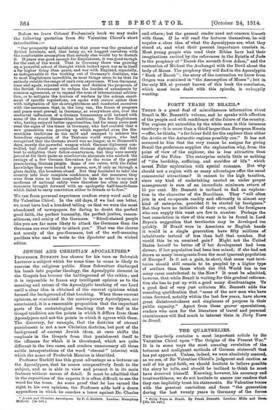FORTY YEARS IN BRAZIL.*
THERE is a great deal of miscellaneous information about Brazil in Mr. Bennett's volume, and he speaks with affection of the people and with confidence of the future of the country. The regions yet untrodden by the white man in this immense territory—it is more than a third larger than European Russia —offer, he thinks, " a far fairer field for the explorer than either the Arctic or the Antarctic regions possibly can." It has not occurred to him that the very reason he assigns for giving Brazil the preference supplies the explanation why, from the point of view of the explorer, she is less attractive than either of the Poles. The enterprise entails little or nothing of " the hardship, suffering, and sacrifice of life " which invest Polar exploration with special romance. But why should not a region with so many advantages offer the usual commercial attractions ? It cannot be the high taxation, since any kind of undertaking carried on under proper management is sure of an immediate minimum return of 15 per cent. Mr. Bennett is inclined to find an explana- tion in the character of the Brazilians. They "will often join in and co-operate readily and efficiently in almost any kind of enterprise, provided it be started by foreigners." But they have no initiative of their own, and the foreigners who can supply this want are few in number. Perhaps the best consolation in view of this want is to be found in Lord Bryce's suggestion that territories may be developed too quickly. If Brazil were in American or English hands it would in a single generation have fifty millions of inhabitants instead of less than half that number. But would this be an unmixed gain ? Might not the United States herself be better off if her development had been slower; if her population had been less mixed; if she had not drawn so many immigrants from the most ignorant population of Europe P Is it not a gain, in short, that some vast terri- tories should still remain to be peopled by a higher type of settlers than those which the Old World has in too many cases contributed to the New ? It must be admitted, however, that while Brazil is waiting for this gradual reforma- tion she has to put up with a good many disadvantages. To a good deal of very just criticism Mr. Bennett adds the consoling qualification that " some of the new men who have come forward, notably within the last few years, have shown great disinterestedness and singleness of purpose in their public capacity." Apart from these graver speculations, readers who care for the literature of travel and personal reminiscence will find much to interest them in Forty Years in Brazil.


































 Previous page
Previous page